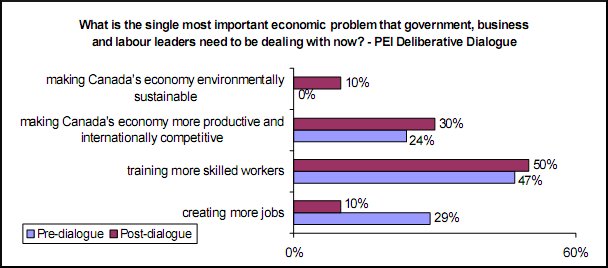Participants were asked to gauge the importance of 13 different actions
that could be used to address skills needs and the aging workforce.
8.3 High Priority Actions (Provincial)
Participants to the deliberative dialogue sessions were asked to gauge the
importance of 13 different actions that could be used to address skills
needs and the aging workforce:
- Stem the out-migration of young people.
- Attract more immigrants with the job skills we need.
- Do nothing - let the market forces naturally resolve the issue.
- Provide better supports to those who may face barriers to entering
the labour market (e.g. the long-term unemployed, minority
communities, those with literacy problems, Aboriginals etc.)
- Encourage older workers to continue working for several more years.
- Encourage higher education and lifelong learning.
- Create decent and secure job opportunities for people.
- Increase economic productivity through investments in R&D and training.
- Encourage innovation and entrepreneurship.
- Improve coordination across business, labour, government and the education
system.
- Encourage employers to provide more and better training to their
employees.
- Address literacy and numeracy issues in the general population.
- Ensure that young people understand the benefits and rewards of
working in the skilled construction trades, like plumbing and
carpentry.
Each action was evaluated along a five-point scale ranging from "not at all
important" to "very important." In addition, participants were asked to
specify from the list of 13, the three actions they felt were priorities.
Participants carried out the evaluation and prioritization exercise in both
the pre- and post-dialogue questionnaires.
